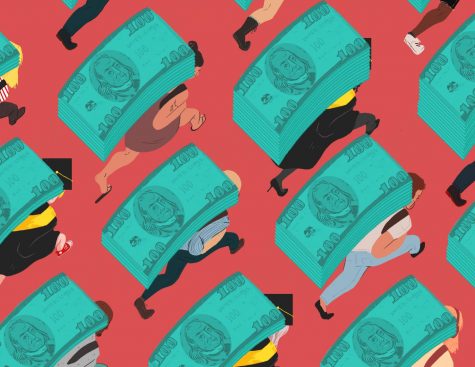Trump proposed 2020 budget could be end of subsidized loans
March 22, 2019
Freshman game art major Dayanara Ocampo and her family are scared to take out student loans. But because her family is paying for her sister’s medical

bills, she may soon have no choice.
The proposed 2020 federal budget would eliminate subsidized loans to fund a new debt forgiveness program.
“It’s going to be hard,” Ocampo said. “Some students don’t have to worry about [loans], but the majority of us do.”
Subsidized loans do not accrue interest while students are in college and, if eliminated, students would only be able to take out private or unsubsidized loans. The proposed debt forgiveness program would absolve undergraduate loans after 15 years and graduate loans after 30 years, as opposed to the current 20 years.
Cody Hounanian, Program Director of Student Debt Crisis, a nonprofit for student debt reform advocacy, said the elimination of the subsidized loans could drive students to take out private loans, where there may be less consumer protection, and fewer repayment options or choices if they fall into default.
The proposed budget would also replace the Public Service Loan Forgiveness Program, which forgives remaining balances of loans after people make 120 qualifying monthly payments while also working full time for a nonprofit or the government.
The Public Service Loan Forgiveness Program denied 99 percent of applicants for loan forgiveness. The program was started in 2007, and students were first able to apply for forgiveness in October 2017, as reported March 18 by The Chronicle.
“Without PSLF, they are at risk,” said Hounanian.
Sophomore radio major Nicholas Stroud said nothing positive will come of the proposed changes. He added that it takes a toll on students’ mental health when student loans start acquiring interest.
“Republicans annually try to cut these programs,” said Natalia Abrams, executive director of Student Debt Crisis. “It’s really sad. … If we were to get rid of these programs, it would cost borrowers thousands of dollars each, those who are counting on the program.”
While Hounanian was critical of the suggested changes, he said people have asked for an overhaul of the student forgiveness program.
Overall, the budget requested $62 billion for the Department of Education, a 12 percent decrease compared to the 2019 budget.
“These reforms would reduce inefficiencies and waste in the student loan program and focus assistance on needy undergraduate student borrowers,” the budget proposal stated.
The federal budget also proposed combining income-driven repayment plans, which base monthly student loan payments on the income of the borrower and family size.
Under the proposed single income-driven repayment plan, all student borrowers‘ monthly payment would be capped at 12.5 percent of their discretionary income.
Bruce McClary, vice president of communications for the National Foundation for Credit Counseling, a nonprofit that helps people manage debt, said there is a benefit to combining the income-driven income because it eliminates some of the confusion students have. But McClary also said students will have fewer options to find the plans that best fit their budget.
The proposed budget must first be approved by Congress before being implemented.
https://open.spotify.com/episode/0dOLtB6AMhtAuU74KS34A2







